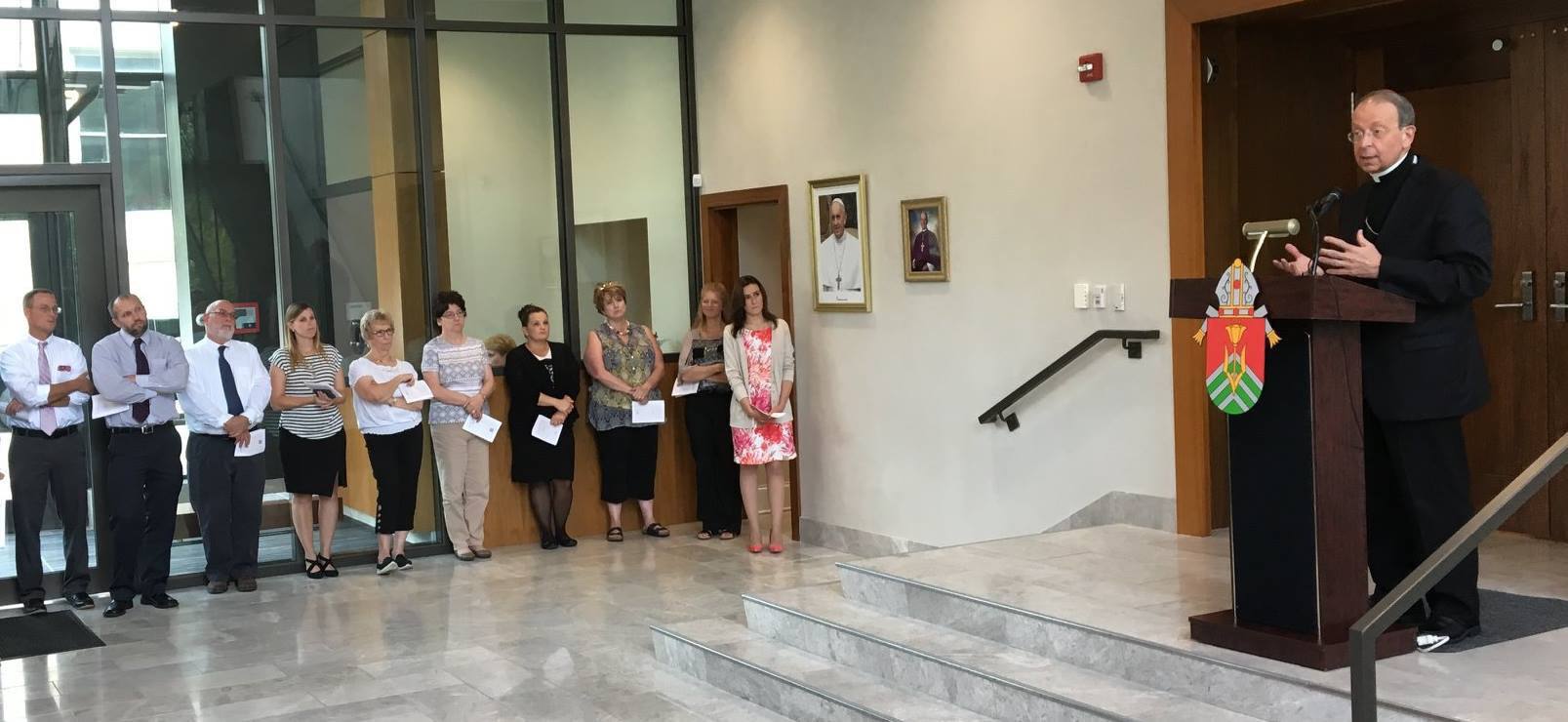
Archbishop William E. Lori of Baltimore leads a prayer service for employees of the Diocese of Wheeling-Charleston in Wheeling, W.Va., Sept. 14, 2018. A day earlier Pope Francis accepted the resignation of Bishop Michael J. Bransfield, 75. He named Archbishop Lori as apostolic administrator and instructed him to conduct an investigation into allegations the now-retired bishop sexually harassed adults. (CNS photo/The Catholic Spirit/Colleen Rowan)
A lay group that urged West Virginia Catholics to withhold support for their diocese claimed victory after Archbishop William Lori announced July 17 that the Diocese of Wheeling-Charleston will undergo an independent financial audit.
"I clearly understand that the Church has a long way to go to regain your confidence and trust," Lori, archbishop of Baltimore who is also serving as administrator for the Diocese of Wheeling-Charleston, wrote to West Virginia's Catholics. Lori disclosed that the diocese would engage the services of CliftonLarsonAllen LLP for a full audit of its finances.
Lay Catholic Voices for Change sent Lori a July 9 letter signed by more than 800 West Virginia Catholics urging the archbishop to institute an audit. The group had urged Catholics not to donate to diocesan causes this weekend. It said it is now calling off its "Not a Dime for the Diocese" campaign.
"This is an important first step in a long process of reform," said Charles DiSalvo, a member of the group's Steering Committee. "It is a basic structural change that will help bring about a healthier distribution of power between the hierarchy and West Virginia Catholics. Up to now, the diocese has kept the laity in the dark regarding its actual income and expenditures. With this increased measure of information, West Virginia Catholics will be that much more empowered to see that the funds they entrust to the diocese are spent properly."
The diocese, which covers the entire state, has been rocked by a scandal involving Bishop Michael Bransfield, who retired in 2018. Bransfield was accused of reckless spending and sexually harassing priests and seminarians, charges deemed credible in a report authorized by Lori released in June.
A July 3 story in The Washington Post said U.S. and Vatican officials had for years received complaints from those concerned by Bransfield's spending.
Media accounts indicated that Bransfield spent more than $4.6 million on his residence, $2.4 million on travel and $350,000 on financial gifts to other church leaders, some of whom, including Lori, later investigated him.
Those expenses included a thousand dollars a month in liquor and daily fresh flowers delivered to the diocesan office, costing up to $182,000 over 13 years, and $350,000 in gifts to priests, bishops and cardinals spread around the country and at the Vatican. Among those who received gifts was Lori.
In a letter June 5, Lori said that the report he authorized deemed as credible accusations of sexual harassment against Bransfield. The report also said that Bransfield used diocesan funds to pay for an opulent lifestyle.
Lori's letter said that lay Catholics in West Virginia were right to question their church's accountability.
"Reports about the former bishop's excessive spending and extravagant lifestyle and the credible allegations that he harassed young priests and seminarians have been a source of great pain and caused many to rightly ask: How could such behavior go unchecked for so long a time? Is there a process in place to check a bishop's behavior when he takes advantage of his co-workers or when he misuses diocesan funds that should be dedicated to the Church's mission?" he wrote.
Suzanne Kenney, a leader of the lay group, told NCR that an audit is needed after years when Bransfield's spending was ignored by diocesan leaders.
"There's a lot of anger," she said about the mood among many of West Virginia's Catholics. "How is it that no one noticed?"
[Peter Feuerherd is NCR news editor. His email address is pfeuerherd@ncronline.org.]
Advertisement





